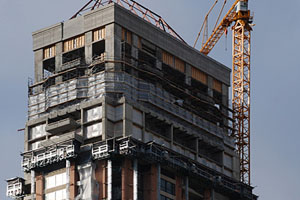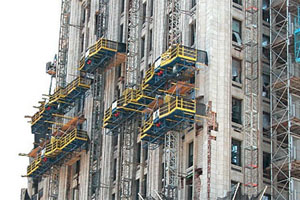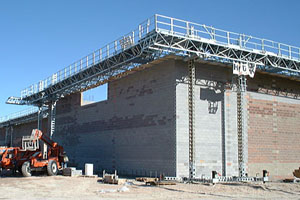Mast Climber Case Studies
By Masonry
For many mason contractors, mast climber scaffolding is an essential tool for their crews to get around difficult job sites. Several manufacturers have joined us in this issue to present case studies demonstrating how this type of scaffolding can improve productivity and alleviate job site headaches for mason contractors.

The first North American mast climber was created by Hydro Mobile in the mid 1980s to provide the masonry industry with a safer and more productive alternative to traditional scaffolds. Twenty years later, Hydro Mobile has made its way not only in the masonry world, but also in other areas of the construction industry, by diversifying its line of mast climbing work platforms.
The Canadian manufacturer now commercializes three lines of products: the M-series, which supports up to 20,000 pounds, is most commonly used for masonry and other facade works; the P-series, which is designed for smaller jobs or restrained areas that require a high loading capacity (up to 10,000 pounds); and the flexible F-series that offers the highest speed to capacity ratio on the market, lifting 15,500 pounds at 39 feet per minute.
"We decided to diversify our [systems] and designed a range of mast climbers suitable for any construction or restoration project," said Vincent Dequoy, president of Hydro Mobile. "We know that the whole construction industry now feels the pressure from an increase in competition, stricter time constraints, and workforce shortage. It is getting harder for contractors and subcontractors of any size to be profitable; and this context is driving growth in the mast climber market as [mast climbing systems] considerably improve productivity, safety and working conditions."
In fact, many modern construction projects have proven that finishing a contract on time and within budget can be achieved only by using mast climbing work platforms. One good example is the Columbian, a residential masonry skyscraper in downtown Chicago.
This 507-foot-tall building is to become the tallest handset masonry structure in Chicago, with 49 stories. In fact, with 20 P-series platforms in use, this project moves forward at the impressive pace of 10,500 square feet of concrete floor every two days. It even drew the attention of the National Geographic Channel; it was featured in a show titled "MegaStructures: Science of Brick."
The facade work of the Columbian presented great technical challenges, as Erwin Bernhardt, project manager at Garth/Ceisel Joint Venture LLC, explained: "We originally planned to use precast for the facade, but because of the large and complex footprint of the building, we did not have enough room for a second crane and realized that we needed to find another solution. That's when Hydro Mobile's R&D team came up with a customized solution involving 20 P-series, enabling us to access the whole facade, up to 500 feet in height, and to lay 315,000 bricks in total."
Whether used with single- or twin-mast setups, resting on the building's concrete base or on cantilever beams, those P-series platforms carry up to 9,750 pounds each, and provide safe and stable work areas. As the owner's representative from the Davis Group LLC, Rick James, explained: "I was very pleased with the safety, quality and adaptability that Hydro Mobile platforms provide. ... The strength and integrity of this access equipment allowed the masons the security and confidence to place face brick up to the 47th floor with no problem, and with the weather enclosure, they basically worked all winter long."
Hydro Mobile is a privately owned corporation. The company is mainly involved in the design, manufacturing and distribution of mast climbing work platforms for the construction industry. Hydro Mobile platforms are distributed throughout North America and Europe, with more than 5,000 platforms on the market.

Since then, Dunlop's climbers have been used on hundreds of projects worldwide, including the high-profile work on the Empire State Building in New York to repair all of the building's eight corners. Using mechanical limit switches to keep the two mast climbers within a safe proximity, Dunlop designed and installed the first-ever, twin-operational mast climber on a single mast. The lower mast climber was fitted with overhead protection and was used for demolition and limestone removal, while the upper mast climber was used for the installation of the new limestone. This new design allowed the contractor, Abest Contracting, to complete the project one year ahead of schedule, and eliminated the need for work delays from injuries or accidents from equipment use.
Recently, Dunlop Mastclimbers was asked to provide equipment for the restoration of 90 West St., Manhattan, N.Y., at Ground Zero — a 24-month project to repair damage to the North façade caused by the explosions from the Twin Towers. Dunlop used the same two-tier concept from the Empire State Building project to remove all the damaged terra cotta before replacing it with new terra cotta. Because of the efficiency of the equipment, the contractor, Seaboard Waterproofing, was able to complete the project quicker and under budgeted costs. Seaboard's workers said they preferred to use the Dunlop mast climbers rather than regular scaffold frames and swing stages.
Dunlop Mastclimbers has been actively involved in the preparation and implementation of the ANSI A92.9 standard for mast climbers, and the revised edition, to harmonize the standards for mast climbers in line with E.N 14 European Standards. Dunlop also has advised OSHA on the safe working practices for mast climbers, and has trained the Carpenters and Laborers Unions of Boston and New York. Further, the company has assisted with the production of safety manuals for these trades on the installation and use of mast climbers.

Glenn Bott with Ace Masonry and Robby Hagan with Ramm It report that the Hydek system greatly increased productivity when compared with the conventional scaffolding traditionally utilized by Ace Masonry.
Ace Masonry, the largest Hydek user west of the Mississippi River, purchased more than 800 lineal feet of Hydek mast climbers, allowing great flexibility when used alone or in conjunction with the contractor's large investment in conventional walk-through scaffolding.
Two recently completed projects demonstrate the productivity increases achievable with the Hydek system.
The new Las Vegas Athletic Club was completed 28 days ahead of schedule and the mast climbing system was then moved immediately to a new Lowe's facility in North Las Vegas. The Lowe's project also was completed well ahead of schedule; the Hydek system was key to completing both projects in the time allotted for just one. While Bott did not reduce his head count on the jobs, he still achieved nearly a 50-percent reduction in labor costs because of the rapid completion of the projects. By reducing the time invested on each project, Ace Masonry is able to bid and complete more projects with the same staff.
The setup included erecting the system in bearing mode to achieve the most wall coverage. This also allowed Ace Masonry to leave the door openings unobstructed and provided easy access to the inside of the structure for other trades to complete their work more effectively. Bott's crews quickly learned and adapted to the Hydek system and are proficient in its use.
Hydek is an Atlanta, Ga.-based manufacturer of high capacity hydraulic mast-climbing systems and distributes internationally.
About the Author
Masonry, the official publication of the Mason Contractors Association of America, covers every aspect of the mason contractor profession - equipment and techniques, building codes and standards, business planning, promoting your business, legal issues and more. Read or subscribe to Masonry magazine at www.masonrymagazine.com.


















